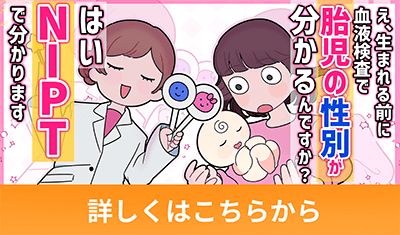- What is the purpose of a prenatal checkup?
- What kind of tests are performed at a prenatal checkup?
- Prenatal checkup schedule
- How much does a prenatal checkup cost?
- NT measurement is insufficient in ultrasound examination during pregnancy checkup
- What is NIPT (New Prenatal Diagnosis), which allows you to detect diseases in your baby before birth
- What is NIPT (New Prenatal Diagnosis), which can be performed only by maternal blood sampling
- Features of Hiro Clinic NIPT
- Hiro Clinic NIPT original plan to choose from
- Hiro Clinic NIPT results will be communicated within 2 days at the earliest
- HiroClinic NIPT is fast and accurate
- The “right to know” supported by Hiro Clinic NIPT
- High test accuracy of Hiro Clinic NIPT
- Hiro Clinic NIPT can also test for twins
- If the result of NIPT (New Prenatal Testing) is positive
- What is amniocentesis
- What are the benefits of receiving NIPT (New Prenatal Testing) in addition to prenatal checkups
- Summary
What is the purpose of prenatal checkups?
The purpose of prenatal checkups is to monitor the health of the mother and baby and to conduct necessary tests to prepare for any unforeseen circumstances.
It is often said that “pregnancy is not a disease,” but pregnancy carries various risks.
Among the most common diseases that mothers are susceptible to are pregnancy-induced hypertension and gestational diabetes.
During pregnancy, a mother’s blood pressure is likely to increase and her blood sugar level is likely to decrease.
If these conditions are left untreated, blood flow to the placenta can become poor, making the baby more susceptible to miscarriage, premature birth, and illnesses.
When a mother suddenly becomes unwell, she needs to be treated promptly at an obstetrician-gynecologist. However, if she does not have regular checkups, she will not know how many weeks pregnant she is or whether she has an infectious disease, and will not be able to receive appropriate treatment. This could pose a great risk to the life of not only the fetus, but also the mother.
For these reasons, prenatal checkups are extremely important to ensure a safe birth for both mother and child.
What tests are done during prenatal checkups?
During prenatal checkups, the following tests are performed to monitor the health of the mother and baby:
- Blood pressure measurement
- Urine tests
- Weight measurement
- Abdominal circumference and fundus measurement
- Doctor and midwife consultation
In addition to these basic tests, we also conduct tests necessary for each week of pregnancy to check the mother’s health and the baby’s development.
Prenatal checkup schedule
The content of prenatal checkups varies depending on the four stages of pregnancy: first trimester, early pregnancy, mid-pregnancy, and late pregnancy.
Check below to see what your health check schedule will be.
[First medical checkup]
Your first prenatal checkup is the first checkup you have when you think you might be pregnant.
Visit your local obstetrician-gynaecologist or midwifery clinic to receive a definitive diagnosis of pregnancy.
Unless you have already taken a urine test with a pregnancy test, a urine test will be performed before your appointment.
An ultrasound examination can be performed at your first prenatal checkup.
After the urine test, a pelvic exam and ultrasound will be performed to confirm whether or not there is a baby in the womb.
However, since the baby is still small in the early stages of pregnancy, the examination will be done using a transvaginal ultrasound, in which an ultrasound is inserted through the vagina to get a good view of the baby.
Pregnancy to 23 weeks: Once every 4 weeks
From the second checkup until the 23rd week of pregnancy, you will have checkups once every four weeks.
In addition to basic items such as blood pressure and waist circumference measurement,
- Blood test (once in the early stages)
- Cervical cancer screening (once in the early stages)
- Echo examination (twice during the period)
- Genital chlamydia testing
These are the main inspection items.
Blood tests are used to check blood type, blood sugar level, iron level, and other conditions, as well as the presence or absence of infectious diseases.
Infectious diseases can have a serious impact on the baby’s health, so it is important to get tested at an early stage.
24-35 weeks: Once every 2 weeks
From the 24th to 35th week of pregnancy, you will have a checkup once every two weeks.
In addition to the basic inspection items
- Blood test (once during the period)
- Group B Streptococcus (once during the period)
- Echo examination (number of times varies depending on the hospital)
These are the main inspection items.
Group B hemolytic streptococcus is a normal inhabitant of the vagina and rectum, but if it infects a baby it can cause infections such as pneumonia and sepsis.
The test can be performed by swabbing vaginal or anal secretions.
During the middle of pregnancy, symptoms such as anemia and high blood pressure are more likely to occur, so it is important to have thorough medical examinations and maintain a balanced diet.
36 weeks of pregnancy to birth: Every week
After the 36th week of pregnancy, the possibility of giving birth increases, so you will have weekly checkups.
The following two tests will be added to the basic tests.
- Blood test (once during the period)
- Echo examination (once during the period)
As the due date approaches, it becomes even more important to check the baby’s health.
An NST (non-stress test) is a test in which you lie down for 30 to 40 minutes and then your baby’s heart rate and uterine contractions are checked to see if your baby is healthy.
The doctor will thoroughly check the opening of your cervix and the degree to which your baby has descended in preparation for birth.
How much does a prenatal checkup cost?
Pregnancy is not considered a “disease” under health insurance, so it is not covered by insurance. Therefore, many mothers may be worried about the cost of tests conducted in the early stages of pregnancy.
All tests and prenatal checkups conducted during early pregnancy are at the patient’s own expense, and the cost of one test is approximately 5,000 to 15,000 yen.
However, in Japan, each local government subsidizes the cost of prenatal checkups, so it is possible to receive a subsidy voucher for the checkup fee upon application.
The number and amount of subsidy vouchers vary depending on the municipality. For example, in Yokohama City, Kanagawa Prefecture,
- 4700 yen x 11 pieces
- 7000 yen x 1
- 12,000 yen x 2
You can receive a total of 14 cards.
Please check with your local government office or town hall in advance to see if subsidy vouchers are available in your area.
How to receive a subsidy
To receive a subsidy voucher for prenatal checkups, you will need to notify your local city, town or village office.
The required documents are determined by each city, town, or village, but in most cases
- Pregnancy Notification Form
- Documents identifying the doctor or midwife who diagnosed your pregnancy
Something like this is needed.
Once you have submitted the notification, you will be issued a subsidy voucher and a maternal and child health handbook, and will be ready for your prenatal checkups.
Home birth costs are reimbursed later
Prenatal checkup subsidy vouchers are issued by the city, town, or village in which you live, but what happens if you have a prenatal checkup at an obstetrics and gynecology clinic or midwifery clinic outside of your current address, for example if you give birth at your hometown?
Unfortunately, the subsidy voucher cannot be used for prenatal checkups at a location other than your current address.
However, you can get a refund for the screening fee by filing a claim with your city or town after you return to your current address.
The scope of the refund varies depending on the area. For example, in Chiyoda Ward, Tokyo,
- 14 prenatal checkups
- 2 ultrasound examinations
- Cervical cancer screening once
The above is the set limit.
If you are going to have a health check away from your current address, be sure to check with your local government office in advance to confirm the scope of subsidies.
If you don’t have enough health check vouchers
There are set tests that are required during prenatal checkups, but the number of ultrasound examinations and blood tests may increase depending on the mother’s physical condition and the baby’s health.
As the number of tests increases, it is not uncommon for the subsidy vouchers to run out. Since you cannot add more vouchers when you run out, you will have to pay for them out of pocket.
Plan ahead to make sure you can fit any additional tests into your budget by inquiring about their cost.
However, if treatment is required for conditions such as pregnancy-induced hypertension or gestational diabetes, this may be covered by insurance.
Even if your medical expenses turn out to be high, any medical expenses over 100,000 yen can be deducted from your taxable income, reducing your medical expense burden. For expenses you paid out of pocket, be sure to keep receipts and keep a proper record so you can file your tax return.
What are the hospital costs associated with pregnancy and childbirth?
Generally, hospital expenses from pregnancy to delivery are paid for by the mother. There are various costs involved, such as hospitalization fees, delivery fees, neonatal care fees, and fees for tests, medicines, and procedures, which may make many mothers anxious.
However, whether you choose natural childbirth (vaginal birth), painless childbirth, or Caesarean section, your health insurance will pay you 420,000 yen per child as a “lump sum birth benefit.” Once your pregnancy is confirmed, it is important to research in advance the costs of early pregnancy tests (prenatal checkups), hospital fees, local government and medical expense deductions, etc.
NT measurement is insufficient in ultrasound examinations for prenatal checkups
NT (fetal nuchal translucency) refers to the thickness of the nape of the fetus when observed with ultrasound. If NT is measured accurately and found to be thicker than normal, it is considered highly likely that there is a chromosomal abnormality such as trisomy 21 (Down syndrome) . However, NT is a very delicate test in which the measured values change depending on the position of the fetus. In addition, since specialized measurement techniques are required, it can be said that the ultrasound examinations used during prenatal checkups are insufficient.
At Hiro Clinic NIPT, we have introduced the Xario100 ultrasound diagnostic device, which allows for high-resolution image diagnosis, for those who have been diagnosed with abnormal NT thickness during prenatal checkups. Both transvaginal and abdominal ultrasound examinations can be performed by specialists with advanced diagnostic and measurement techniques, allowing you to thoroughly examine the health of your baby.
* Please contact Hiro Clinic NIPT for information on clinics that perform ultrasound diagnosis .
What is NIPT (New Prenatal Testing) that can detect a baby’s illness before birth?
Prenatal checkups check the health of the mother and baby through blood tests and ultrasound examinations. However, these tests alone cannot detect chromosomal abnormalities, such as those listed below.
- Trisomy 21 (Down Syndrome)
- Trisomy 18 (Edwards syndrome)
- Trisomy 13 (Patau syndrome)
- Klinefelter syndrome
- Turner syndrome, etc.
In order to detect chromosomal abnormalities and congenital diseases in the fetus, there are methods such as chorionic villus sampling and amniocentesis, which are not included in prenatal checkups, but neither of these can be performed in the early stages of pregnancy. These tests involve inserting a needle into the amniotic sac from outside the body to extract cells, which can increase the risk of miscarriage, so why not consider the highly safe NIPT (non-invasive prenatal testing) test?
What is NIPT (New Prenatal Testing) that can be done only by taking maternal blood?
NIPT (non-invasive prenatal testing) is a test method that does not require inserting a needle into the body, as was the case with previous tests . NIPT is performed by simply taking a blood sample from the mother’s arm, so it is a test method that places a very low burden on both the mother and the fetus.
Using the mother’s blood , we can check for chromosomal abnormalities in the fetus, such as ” Trisomy 21 (Down syndrome) ,” ” Trisomy 18 (Edwards syndrome) ,” and ” Trisomy 13 (Patau syndrome) .” At Hiro Clinic NIPT , we also perform NIPT to check for sex chromosome aneuploidy, partial deletions and duplications of all autosomal regions, microdeletion syndromes, autosomal recessive inheritance, etc., to check the baby’s health in more detail.
Features of Hiro Clinic NIPT
Choose from Hiro Clinic’s original NIPT plans
At Hiro Clinic NIPT, we offer NIPT (a new type of prenatal testing) that places less of a burden on mothers and babies. The unique feature of Hiro Clinic NIPT is that in order to provide better NIPT, we offer a wide variety of plans and options, including positive score reports , based on the vast amount of data from pregnant women who have undergone testing . You can choose a test that suits the mother’s age and your budget.
Hiro Clinic NIPT results available in as little as 2 days
Hiro Clinic NIPT requests testing from the Tokyo Metropolitan Institute of Hygiene, a domestic institution specializing in human genetic testing. Previously, NIPT (new prenatal testing) often required testing from overseas specialist institutions, which resulted in a long wait for test results. In order to sympathize with the anxiety of mothers, Hiro Clinic NIPT delivers results within 8 days (excluding some plans) for 95% of patients after blood collection. In addition, all Hiro Clinic NIPT clinics, excluding affiliated facilities, offer the express delivery option (delivery in as little as 2 days after blood collection).
Hiro Clinic NIPT is fast and accurate
At Hiro Clinic NIPT, we manage the barcodes from the time of blood collection to prevent sample mix-ups. The barcodes are read directly into the testing equipment at the Tokyo Medical Laboratory, so the risk of human error is extremely low. At Hiro Clinic NIPT, we promise to manage personal information appropriately and strictly so that we can provide you with information about your precious baby’s health condition quickly and accurately.
Hiro Clinic NIPT supports the “right to know”
Many NIPT (non-invasive prenatal testing) testing institutions only detect trisomies. However, Hiro Clinic NIPT uses the latest medical technology to report monosomies as well, in order to “support the right of pregnant women to know.”
* Trisomy: A condition in which one chromosome is extra
* Monosomy: A condition in which one of a pair of chromosomes is missing
High accuracy of Hiro Clinic NIPT testing
NIPT (New Prenatal Testing) has a sensitivity of 99.9% and a specificity of 99.9% for trisomy 21 (Down syndrome) . Hiro Clinic NIPT is performed by specialists, and the results of the test are explained in easy-to-understand terms from a medical perspective.
Hiro Clinic NIPT also allows testing for twins
Many NIPT-related medical institutions do not accept NIPT tests for twins. Even if they do, the tests are limited to chromosomes 13, 18, and 21. Hiro Clinic NIPT can test for all chromosomal aneuploidies, partial deletions and duplications in all autosomal regions, even in twins.
If the result of NIPT (new type prenatal testing) is positive
NIPT (New Prenatal Testing) is a non-definitive test. Therefore, if the test result is positive, a definitive test using amniocentesis is required. Hiro Clinic NIPT has established an amniocentesis support system to reduce the financial burden, and will subsidize the cost of amniocentesis up to 200,000 yen (tax included) for those who have a positive NIPT result.
What is amniocentesis?
This is a test to check the baby’s health by inserting a needle into the mother’s abdomen and collecting cells from the amniotic fluid. While NIPT (non-definitive prenatal testing) is a test that determines the probability of the presence or absence of chromosomal abnormalities (a non-definitive test), amniocentesis is a test that determines the presence or absence of congenital diseases with certainty (a definitive test).
Amniocentesis can reliably check the health of the baby, but since the amount of amniotic fluid is small in the early stages of pregnancy, the best time to have the test is between the 15th and 18th weeks of pregnancy, when the amniotic fluid increases. Because amniocentesis carries a risk of miscarriage, a specially trained obstetrician will apply an ultrasound to the mother’s abdomen to check the position and heartbeat of the fetus, and will perform amniocentesis with the utmost care.
Pain and time required for amniocentesis
To collect amniotic fluid, a longer needle is used than for regular injections. However, since local anesthesia is administered before the needle is inserted, it is said to be less painful. It is important to tell your doctor about any anxiety you may have and to relax during the examination.
Amniocentesis takes about an hour. After the safety of the mother and fetus is confirmed and the needle is carefully inserted, you will need to rest for about 30 to 40 minutes.
Amniocentesis reveals your baby’s health
The amount of amniotic fluid required for amniocentesis is approximately 10-20ml, and the cells contained in the amniotic fluid can reveal chromosomal abnormalities and risk of disorders. In particular, trisomy 21 (Down syndrome) can be diagnosed with a 99% probability.
What are the benefits of not only prenatal checkups but also NIPT (new prenatal testing)?
The benefits of NIPT (new prenatal diagnosis) performed at Hiro Clinic NIPT include “a test method that places less of a burden on both the mother and child,” “early testing is possible,” and “high test accuracy.” The biggest benefit is that it allows for detailed examination of the baby’s health condition, which cannot be found through prenatal checkups alone.
Hiro Clinic NIPT listens to the concerns of many people from all over Japan and boasts a huge number of tests . We will continue to hone our medical technology and diagnostic capabilities to provide even better medical care.
summary
Prenatal checkups are important tests to protect the health of mothers and babies. Unexpected labor and delivery in unexamined pregnant women who do not even know how many weeks pregnant they are can be very difficult to ensure the safety of both mother and child. Once your pregnancy is confirmed, you should report your pregnancy to your local municipal office and receive regular checkups and health guidance.
If you want to check your baby’s health in more detail, you may want to consider NIPT (new type prenatal testing) , which requires only a blood sample, or ultrasound diagnosis, which allows for high-resolution images. If you have any concerns about NIPT, please contact Hiro Clinic NIPT . Pregnancy is a very delicate period, both mentally and physically. We offer low-impact, high-precision testing to ensure a healthy birth.
【References】
- Japan Society of Obstetrics and Gynecology – Chromosomal Abnormalities
- Ministry of Health, Labor and Welfare – Prenatal Checkup Q&A
- MSD Manual – Chromosomal and Genetic Abnormalities
- Nursing Journal – Background factors of untreated pregnant women
【参考文献】
- Japanese Society of Obstetrics and Gynecology- Chromosome abnormalities
- Ministry of Health, Labor and Welfare – Pregnancy examination Q&A
- MSD Manuals – Chromosome and Genetic Abnormalities
- Nursing Journal – Background factors of pregnant women who have not been examined
Article Editorial Supervisor

Dr Hiroshi Oka
NIPT specialist clinic, MD
Graduated from Keio University, School of Medicine
 中文
中文






















